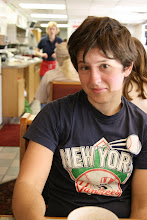
 If my mother is the feeler and my father is the thinker, they would still agree on the same thing, that "work is love made visible". This expression was made notable in the beginning of the 20th century by the spiritual leader (and some would say, prophet) Kahlil Gibran, a Syrian refugee who found his new home in New York City. Perhaps all parents work and love hard, but I think mine are especially focused on the importance of the effort and intentionality behind it. Certainly it's a credo they've raised my brothers and I with. It's sort of like what every kid has heard their parent demand at some point in their life: "say it like you mean it." Because sometimes actions (of "I'm sorry"s, "thank you"s and promises) aren't enough-- there has to be effort behind it for it to really mean something.
If my mother is the feeler and my father is the thinker, they would still agree on the same thing, that "work is love made visible". This expression was made notable in the beginning of the 20th century by the spiritual leader (and some would say, prophet) Kahlil Gibran, a Syrian refugee who found his new home in New York City. Perhaps all parents work and love hard, but I think mine are especially focused on the importance of the effort and intentionality behind it. Certainly it's a credo they've raised my brothers and I with. It's sort of like what every kid has heard their parent demand at some point in their life: "say it like you mean it." Because sometimes actions (of "I'm sorry"s, "thank you"s and promises) aren't enough-- there has to be effort behind it for it to really mean something.In our family, love is made visible through work. When my parents lived in Iowa City they found a piano on the side of the road. My father spent the better part of the next 6 years stripping the paint off that piano, re-varnishing it, tuning it, and insists to this day that us kids learn how to play it. When I was 2 1/2 my mother bought a bunch of pottery in Spain that broke in her luggage during the flight home to New Jersey. This was right before she returned to Spain and my father and I lived alone without her for a year. My father painstakingly pieced those bowls back together and my mother keeps them in her office to remember this demonstration of hard work and love.
You know, now that I'm thinking about it, it seems like maybe the "work is love made visible" mantra is claimed with more fervency by my father than by anyone else... at least the visibility part. Materiality is important. I finished transcribing my father's stories yesterday and was struck by the polarity between his words and my mother's. My father uses anecdotal facts and descriptions a lot. In his rendition of the story of how my parents met he elaborates in explicit detail about the decrepit quality of the bike my mother was riding at the time, about the make and model of the frame and components, and the labor-intensive process of repairing it. The bike becomes epic, idolized and symbolic. In fact, most of my father's actions are just that: epic, idolized, and symbolic. Christmas, for example, is a big deal-- something he works all year to provide. His college blanket and scarf are objects that we kids are never allowed to touch or borrow. He's always been a collector and cataloguer-- of stamps, coins, records, Faulkner novels and wishbones. And starting when I was very young this is how we spent time together-- repetitive tasks, cleaning our house, getting quizzed on the worth, location or history of objects we owned.
So I started two new drawings based on the phone conversations with my parents I recorded this past weekend (pictures above). The top one I described a couple of days ago, a drawing about my mother's punctuative "you knows" in her storytelling. The bottom one is still just an idea I'm tinkering around with-- I've printed out the text from the descriptions of both my mother and father in which they describe the story of the bowl which broke that my father pieced together. I've cut the text down into single words and am now trying to piece both stories back together in a single narrative. It's probably, like, the ultimate marriage of a puzzle and magnetic poetry.

No comments:
Post a Comment